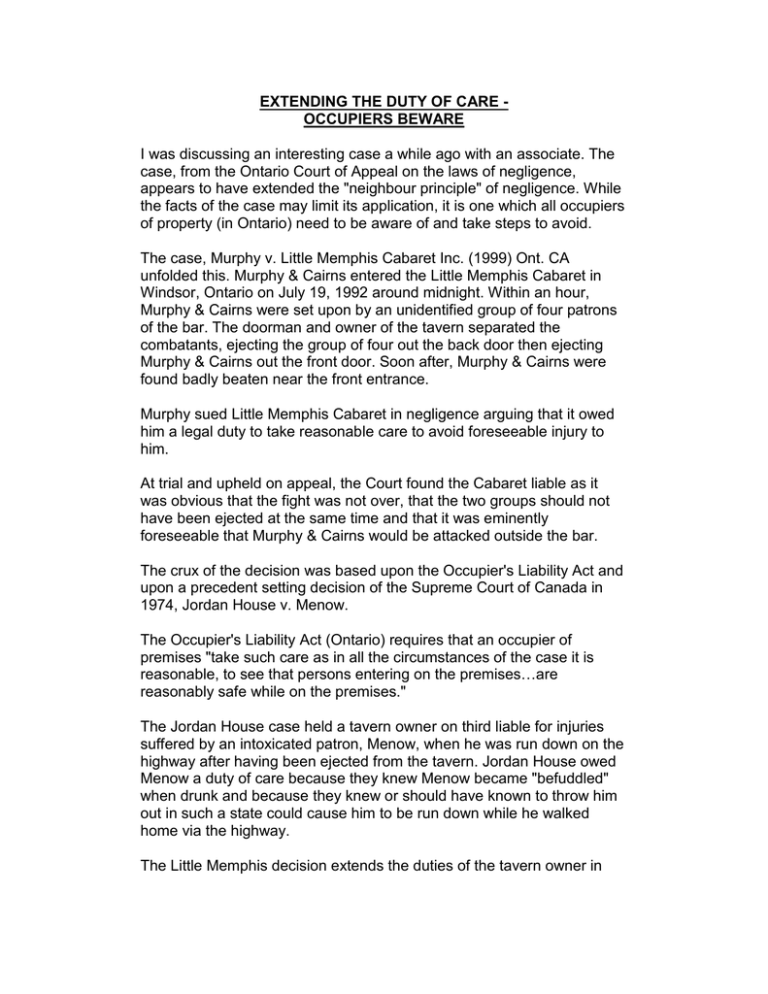
EXTENDING THE DUTY OF CARE OCCUPIERS BEWARE
I was discussing an interesting case a while ago with an associate. The
case, from the Ontario Court of Appeal on the laws of negligence,
appears to have extended the "neighbour principle" of negligence. While
the facts of the case may limit its application, it is one which all occupiers
of property (in Ontario) need to be aware of and take steps to avoid.
The case, Murphy v. Little Memphis Cabaret Inc. (1999) Ont. CA
unfolded this. Murphy & Cairns entered the Little Memphis Cabaret in
Windsor, Ontario on July 19, 1992 around midnight. Within an hour,
Murphy & Cairns were set upon by an unidentified group of four patrons
of the bar. The doorman and owner of the tavern separated the
combatants, ejecting the group of four out the back door then ejecting
Murphy & Cairns out the front door. Soon after, Murphy & Cairns were
found badly beaten near the front entrance.
Murphy sued Little Memphis Cabaret in negligence arguing that it owed
him a legal duty to take reasonable care to avoid foreseeable injury to
him.
At trial and upheld on appeal, the Court found the Cabaret liable as it
was obvious that the fight was not over, that the two groups should not
have been ejected at the same time and that it was eminently
foreseeable that Murphy & Cairns would be attacked outside the bar.
The crux of the decision was based upon the Occupier's Liability Act and
upon a precedent setting decision of the Supreme Court of Canada in
1974, Jordan House v. Menow.
The Occupier's Liability Act (Ontario) requires that an occupier of
premises "take such care as in all the circumstances of the case it is
reasonable, to see that persons entering on the premises…are
reasonably safe while on the premises."
The Jordan House case held a tavern owner on third liable for injuries
suffered by an intoxicated patron, Menow, when he was run down on the
highway after having been ejected from the tavern. Jordan House owed
Menow a duty of care because they knew Menow became "befuddled"
when drunk and because they knew or should have known to throw him
out in such a state could cause him to be run down while he walked
home via the highway.
The Little Memphis decision extends the duties of the tavern owner in
taking reasonable care to non-intoxicated and unknown persons as well.
The significance of this for those who occupy buildings (as owner or as
tenant) should not be underestimated. Many in the legal community have
felt Jordan House (1974) SCC only applied if you had served someone
alcohol to the point where they could not take care of themselves. Thus,
it was felt that there must first be a precondition of putting the person into
a condition where you had to look out for their interests.
Little Memphis seems to be saying it is not just those who are intoxicated
but any patron, whether intoxicated or not, known or not, whom is owed
a legal duty by the occupier of the building. If this is a correct analysis
(we must await other Courts' interpretation to know for sure), then
occupiers in Ontario have a whole new group of persons whom they owe
a duty to take reasonable care and it will not be enough simply to eject
an unruly or undesirable invitee.
All Rights Reserved: Contact: 604:488-0114
WORTHINGTON AND ASSOCIATES LTD.
Box 34192 Station D
Vancouver, B.C. Canada V6J 4N1
604-488-0114 (p) 604-669-5446 (f)
rcworthington@shaw.ca

